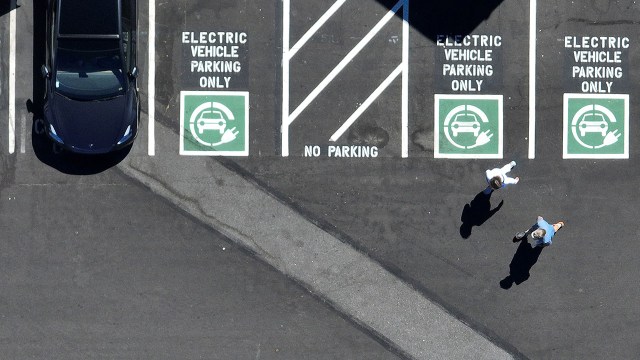Electric Vehicle Charging Infrastructure in the U.S.
64% of Americans live within 2 miles of a public charging station, and those who live closest to chargers view EVs more positively

Pew Research Center conducted this study to understand Americans' views on electric vehicles. We surveyed 10,329 U.S. adults from May 30 to June 4, 2023.
Everyone who took part in the survey is a member of the Center's American Trends Panel (ATP), an online survey panel that is recruited through national, random sampling of residential addresses. This way, nearly all U.S. adults have a chance of selection. The survey is weighted to be representative of the U.S. adult population by gender, race, ethnicity, partisan affiliation, education and other categories. Read more about 

Distribution by state
As has been the case in the past, California has the most EV charging infrastructure of any state. The state is home to a quarter of all public EV charging stations in the U.S., though this represents a slight decrease from 
Americans who live in cities are especially likely to have a public charging station very close to their home. Six-in-ten urban residents live within a mile of a public charger, compared with 41% of suburbanites and just 17% of rural Americans.
Because of this distribution, those who live closest to EV charging infrastructure tend to share the demographic characteristics of urban residents more broadly. For instance, they tend to be relatively young and are more likely to have a college degree than those in other community types.
Looking at political affiliation, 48% of Democrats and Democratic-leaning independents live within a mile of a public charger, compared with 31% of Republicans and Republican leaners.
However, there are no substantial differences in distance to the nearest charger by income. Similar shares of Americans with lower, middle and upper incomes live within a mile of public charging stations.
Attitudes toward EVs vary based on proximity to chargers
On the whole, the American public is fairly skeptical that the U.S. will be able to build the infrastructure necessary to support large numbers of EVs on the roads.

Just 17% of U.S. adults say they are extremely or very confident in the country's ability to develop this infrastructure. But 20% of those who live within a mile of a public charger say they're extremely or very confident that the U.S. will build the infrastructure necessary to support EVs, almost twice the share (11%) among those who live more than 2 miles from a charging station.
Likewise, those who live closer to public chargers are more likely to favor phasing out production of new gasoline cars and trucks by 2035. This view is held by 49% of those who live within a mile of a public charger, but just 30% of those who live more than 2 miles from one.
Owning – or considering – an electric vehicle
Americans who live near a public charger are a bit more likely to say they currently own an electric vehicle or hybrid. As of June 2023, 11% of those who live within a mile of a public charger said they owned an EV or hybrid; that figure is 7% for those who live more than 2 miles from a charging station.
Those who live close to public charging infrastructure are also much more likely to consider purchasing an EV in the future. Around half of those within a mile of a public charger say they are very or somewhat likely to consider purchasing an EV, compared with just 27% of those for whom the nearest charger is more than 2 miles away.

These trends persist if we look at urban, suburban and rural areas separately.
Some transportation experts have suggested that “range anxiety” associated with the need to charge EVs partway through longer road trips is a stumbling block to widespread EV adoption. But our data finds that attitudes toward EVs don't differ that much based on how often people take long car trips.
In fact, those who regularly drive more than 100 miles are slightly more likely to say they currently own an electric vehicle or hybrid – and also to say they'd consider purchasing an EV in the future – when compared with those who make these trips less often.

